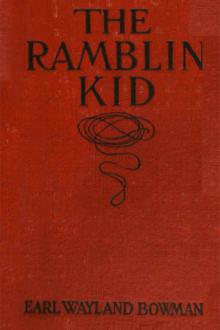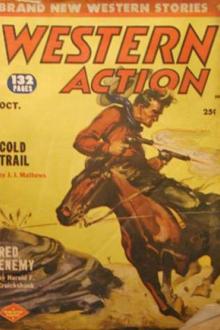Spinifex and Sand<br />A Narrative of Five Years' Pioneering and Exploration in Western Ausralia, David Wynford Carnegie [best novels in english .txt] 📗

- Author: David Wynford Carnegie
Book online «Spinifex and Sand<br />A Narrative of Five Years' Pioneering and Exploration in Western Ausralia, David Wynford Carnegie [best novels in english .txt] 📗». Author David Wynford Carnegie
Our larder was well filled here, and the natives took great interest in our shooting and fishing. I used to take Tiger as retriever when I went duck shooting, and an excellent boy he was too, simply loving the water, and able to swim like any duck; to see him after a wounded bird was most exciting; as soon as he reached it, it would dive until he would be almost exhausted. At last he hit upon a similar plan, and, diving, came up beneath the duck, seized it by the leg and brought it to shore, grinning with delight. A shot-gun would indeed be a treasure to these natives, who manage to kill pelicans and ducks only after hours of waiting, hidden in a hide of bushes until a bird comes near enough to be killed by a throwing-stick.
In some parts of Australia the natives swim out to ducks, concealing themselves under a bunch of rushes and moving very slowly; the ducks are not scared by the rushes, and fall a comparatively easy prey. From what Tiger told me the Sturt natives seem to rely solely upon waiting and stalking. They catch fish in a rather ingenious way, only practicable when the fish are in shallow water; from this they sweep them with a sort of dredge of branches, which they drag through the pools on to the banks; the water runs back through the sticks, leaving the fish high and dry on the sand. The pelican is considered a great delicacy amongst the natives, and every day deputations waited upon us, asking us to shoot the “Coyas” for them, which of course we were very glad to do. They did not repay our kindness very nicely, for they tried to inveigle Warri into their camp for the purpose of killing him, as a stranger meets with no great hospitality! I had sent Warri and Tiger out with a gun to stalk some ducks when a number of blacks tried to get possession of the gun, first by telling Tiger that they wanted to shoot an old man who had annoyed them, then by tempting him with descriptions of the beauties of their wives; but Warri was proof against all these blandishments—nor could they get the gun by force. I think Master Warri was quite glad to come quickly home, for he stood in some awe of the Kimberley natives; “Sulky fella,” he called them.
One day a fresh mob of blacks came in; amongst them we recognised our old friends from Jew's Well. They as soon recognised us, and appeared tremendously pleased. The old Jew patted me, and grinned, and squirmed in a most ludicrous way; I discovered that he was thanking me for having cured his son's eyes—so the lotion had done its work well. As he and his friends sat round I made a sketch of the old man and gave it to him; it was evidently a good likeness, for his friends went into shrieks of laughter and delight. He was equally pleased, and more so still when I let him know that he could keep it.
Shortly afterwards several men came up with great mystery and secrecy, and many looks behind them to see that they were not watched, and a greybeard amongst them presented me with a flat stick carved all over into rough patterns; this was carefully wrapped between two sheets of bark, and was evidently highly treasured, and given as a mark of respect or gratitude for curing the boy's eyes. They also gave me throwing sticks, balls of hair string, a shield and tomahawk; and received numerous costly presents from us—one or two old shirts, strips of coloured handkerchief to make sporrans of, a knife or two, and so forth, and were perfectly satisfied. A curious thing about the old Jew was that he had no name. I questioned him most closely through Tiger—but no! he had never had a name. He was promptly christened “Jacob,” which he repeated over and over again, and seemed pleased with his new acquisition. Godfrey soon had some of the tribe trained in the art of fishing, and this amused them immensely; the man to whom we gave the line and hooks, which we got in Hall's Creek, will be much envied by his mates. There were quantities of mussels in the creek, which the blacks devour greedily; we thought them most disgusting in taste. Larger fish were reported in the big lake, but we did not trouble them. The water of the big lake was far too salt for use, though the natives were camped near it and drink it. It makes them sick, but they use it all the same, so we were told. What happens to all the natives when the lake dries I cannot say; no doubt they scatter far and wide, and meet when the floods come down, for ceremonies, corroborees, and such-like amusements.
I collected a few words which I look upon as reliable. Nothing would be easier than to make a whole dictionary, for the natives are always ready to talk, but I have only taken words which I got from one and tested with others with good results.
English Aboriginal Gregory's “Salt Sea” Burro Fresh water Nappa or Yui Salt water Murraba* Creek Gilli Fire Warru or Wallu** Fish Yagu Mussel Bimbirri Pelican Coya Whistling duck Chibilu*** Moon Yungun Star Gigi Southern Cross Wun-num* Hunt's Slate Well, near Lake Lefroy, Coolgardie Goldfield, which is sometimes salt, is called by the natives Murrabi.
** Same as at Empress Spring and throughout desert.
*** In imitation of the bird's cry.
CHAPTER IV Desert Once MoreApril 20th we left our camp on the lake, steering due East to cut a creek which enters on the North-East corner; the creek was dry, and the nature of its shingly bed inclined me to think that it has its rise in auriferous country. Close by the creek we found a shallow clay-pan, and as the next day would probably see us in the desert I had every available water-carrying vessel filled. Tiger worked well, but a friend of his, who had come with us so far, watched the proceedings with suspicion. On being questioned as to waters to the South-East, he was most positive as to their non-existence, and evidently frightened Tiger so much by his dreadful account of the country that he decided on returning home—for the next morning both he and his friend had disappeared. I was very sorry, for he was a smart lad, and now we were a bit short-handed. Pursuit was of course useless, for he had too great a start, and would soon be lost amongst his tribesmen. He had worked so well that I never suspected him of wishing to go. I fear he will spear Mr. Stretch's cattle after all!
Fully loaded with water, we left the lakes, steering towards Mount Wilson (Gregory); the heat was great, and the flies worse than we had before experienced.
Riding ahead steering was most unpleasant; one hand for the compass, one for the bridle, left nothing with which to frighten the flies from the corners of my eyes, which became quite raw in consequence. Certainly riding is a great improvement on walking, and I prayed that the horses would long be spared to us. Once through the dense scrub surrounding the lake, and our old friends sand and spinifex lay before us. Crossing an open plain, we reached Mount Wilson, from which the lake was plainly visible, at a greatly lower level. This hill is the highest in a little broken range of barren sandstone hills, peaks, knobs, and cliffs of all manner of shapes and sizes. To the eastward stony tablelands can be seen, running from which I noticed what I took to be a creek.
At this point it is interesting to see what Gregory's impressions were of the country ahead. This was the furthest point he reached in 1856, having landed an expedition on the Northern coast and travelled up the Victoria River on to the head-waters of the Sturt Creek, and down that creek to its end. He says:—
From the summit of the hill (Mount Wilson) nothing was visible but one unbounded waste of sandy ridges and low, rocky hills, which lay to the South-East of the hill. All was one impenetrable desert; …the vegetation on this part of the country was reduced to a few stunted gums, hakea bushes, and Triodia (spinifex), the whole extremely barren in appearance… The remaining portion of the horizon was one even, straight line: not a hill or break of any kind, and except the narrow line of the creek, was barren and worthless in the extreme, the red soil of the level portions of the surface being partially clothed with Triodia and a few small trees, or rather bushes, rendering the long, straight ridges of fiery-red, drifting sand more conspicuous.So Gregory retraced his tracks up the Sturt Creek, and when one remembers that he had horses, one can only say, “And a good judge too.”
Leaving Mount Wilson we steered East and cut the creek that I had seen, and were glad to find feed near it for both horses and camels. I walked it up to its head, and found a little rocky pool of water, returning after dark. Breaden and Warri had been out too, but found nothing. Having watered the animals, next morning, the 22nd, I steered a course to take us through a piece of country previously traversed by Warburton, with Lake White (a dry salt-lake) as our goal, for round it I hoped to find creeks and clay-pans. I depended on none of Warburton's waters, though he had some marked on his chart, since I knew that doubts existed as to the accuracy of his positions, and I preferred to rely upon our own methods of finding water rather than to waste time in hunting for wells that we might not find. For the next few days we were crossing spinifex plains and passing distant hills and tablelands of sandstone. The days were very hot, but since rising from the hollow of the lake the nights had become very much cooler. We had come so suddenly into desert country that the animals gave us great trouble, being unable, poor things, to find any food. Late starts were the order of the day, camels having wandered miles in one direction followed by Breaden and Warri, and the horses in another followed by me.
On the 23rd we found ourselves again amongst the sand ridges, high, red, and steep; we were now in lat. 20° 30´, and from that date and point this awful country continued almost without a break, ridge succeeding ridge with perfect regularity and running, as before, dead across our route, until we reached lat. 24° 45´ on June 2nd—a period





Comments (0)